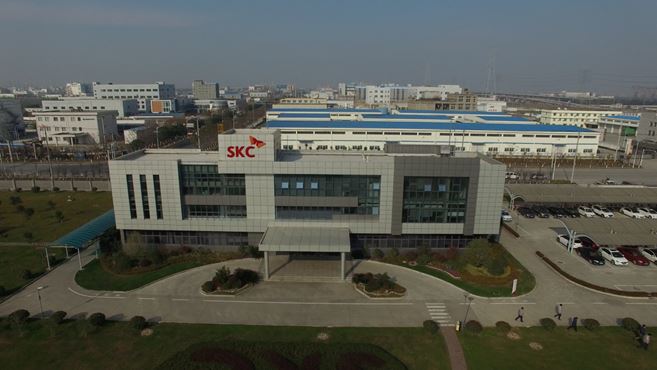NEWS
● Established facilities to produce wet chemicals for LCD and semiconductor and auto parts, targeting sales of 130 billion won by 2021
● The setup of auto specialty film JV will complete the “Second Specialty Complex” that will serve as a new business center in China
SKC (Lee Wan-jae, CEO) will _ create_ the “Second Specialty Complex” in China following the establishment of its Nantong plant in Jiangsu Province, China as part of its accelerating efforts to make inroads into the Chinese market. The complex will house facilities that will produce chemicals for LCD and semiconductors and auto parts. The total cost will be approximately 80 billion won, with sales of 130 billion won and operating profit of 30 billion won targeted for 2021.
In addition, the company is considering setting up an auto specialty film joint venture that -- once completed -- will place the Nantong plant as a new business hub in China for New Biz, chemicals, and films.

<SKC’s Nantong plant located in the Nantong development district in Jiangsu, China will be transformed into the company’s new business hub in China>
SKC will set up a joint venture to invest in the production of wet chemicals for LCD and semiconductors
At the board meeting held on October 25, 2017, SKC decided to establish a joint venture together with a Korean wet chemicals maker and build wet chemicals production facilities in China. Each party will invest 45 billion won in the setup of joint venture in the Nantong plant in China. SKC will own 75.1% of the joint venture, with the remaining 24.9% to be held by the partner.
Wet chemicals are chemicals used in the LCD and semiconductor manufacturing process including washing and etching. The global market is valued at approximately 1.3 trillion won as of 2016, and the Chinese market is growing fast. With related industries making growing investments in China, the demand for wet chemicals is forecast to grow 12~25% each year until 2021.
The joint venture is scheduled to begin construction of local production facilities in the fourth quarter of this year and start commercial production in 2019. About 50% of China’s semiconductor production facilities are concentrated in and around Shanghai and Jiangsu where the Nantong plant is located, making future business expansion easy.
SKC decides to build production facilities for chemicals and auto specialty parts in China, with mass production scheduled for 2019
SKC will build production facilities for polyurethane auto specialty parts next to the wet chemical factory. The board decided to invest 35 billion won and construct the facilities in China during the September meeting.

<An SKC employee is examining a polyurethane auto part (left) used in the suspension (right). The product is a key component of the automobile suspension, which absorbs shocks from the wheels and dampens the vibration and noise.>
The global market is valued at approximately 1.1 trillion won as of 2015, with leading global companies making up the majority. With over 25 years’ technological know-how on polyurethane production, SKC has developed the entire process from the synthesis of raw materials to production. Currently supplying to global automakers, SKC is highly regarded for its quality.
SKC plans to grow into a major global p_ layer_ by targeting premium markets. The Ulsan plant has been running since August 2014, and SKC plans to begin construction of the local plant in January 2018 and launch mass production in February 2019.
Considering the setup of automobile glass specialty film JV, with commercial production scheduled for 2019
SKC is considering building a factory to produce specialty films for automobile glasses on the idle land in its Nantong plant. The company is in talks with a China petrochemical company to set up a joint venture. Once completed, the joint venture will establish the vertical integration system from raw materials to finished products to compete in the global market better.
The market is valued at approximately 2.6 trillion won or 380,000 tons as of 2015, and it has been growing steadily as applications in automobiles increased. In particular, the market for high-performance products with Head-Up Display (HUD) optimization and sound, heat, and UV-blocking systems is expanding at a fast pace of 20 to 30% per year. SKC expects the JV to be able to launch commercial production before the end of 2019, if the project proceeds smoothly.
Superior location, pledge for active support boost hopes for successful new business in China
The Second Specialty Complex will serve as the business hub in China, in addition to the domestic production facilities in Ulsan, Suwon, and Jincheon. Nantong Development District, where the Complex will be _ create_d, is the only chemicals complex in and around Shanghai, and it offers attractive incentives. Specifically, the complex is well-equipped with infrastructure including highways and ports; thus offering a great logistics advantage.
In addition, Nantong Development District pledges active support, making the Second Specialty Complex an ideal location as the company’s business hub in China. The District agreed to provide various incentives for SKC’s new business and work closely with SKC on licenses and other issues to ensure that the business proceeds smoothly.
“The Second Specialty Complex to be set up in the Nangtong factory will be the business hub in China that will play a critical role in realizing SKC’s new vision of Global Specialty MARKETER. The complex will serve as a bridgehead for SKC to ensure business scalability in the Chinese market,” SKC CEO Lee Wan-jae said. [End]
